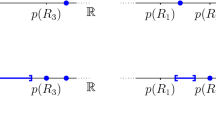Abstract
This article considers the provision of two public goods on tree networks where each agent has a single-peaked preference. We show that if there are at least four agents, then no social choice rule exists that satisfies efficiency and replacement-domination. In fact, these properties are incompatible, even if agents’ preferences are restricted to a smaller domain of symmetric single-peaked preferences. However, for rules on an interval, we prove that Miyagawa’s (Soc Choice Welf 18:527–541, 2001) characterization that only the left-peaks rule and the right-peaks rule satisfy both of these properties also holds on the domain of symmetric single-peaked preferences. Moreover, if agents’ peak locations are restricted to either the nodes or the endpoints of trees, rules exist on a subclass of trees. We provide a characterization of a family of such rules for this tree subclass.
Similar content being viewed by others
References
Barbera S, Bevia C (2002) Self-selection consistent choices. J Econ Theory 105: 263–277
Barbera S, Bevia C (2006) Locating public facilities by majority: stability, consistency and group formation. Games Econ Behav 56: 185–200
Berge C (1985) Graphs. North-Holland Mathematical Library, North-Holland
Bochet O, Gordon S (2008) Priorities in the location of multiple public facilities. Working paper 2008-07, University of Montreal
Bogomolnaia A, Nicolo A (2005) Stable assignment of public facilities under congestion. J Public Econ Theory 7: 63–95
Ching S, Thomson W (1997) Population-monotonic solutions in public good economies with single-peaked preferences. Soc Choice Welf (forthcoming)
Danilov VI (1994) The structure of non-manipulable social choice rules on a tree. Math Soc Sci 27: 123–131
Demange G (1982) Single-peaked orders on a tree. Math Soc Sci 3: 389–396
Ehlers L (2001) Independence axioms for the provision of multiple public goods as options. Math Soc Sci 41: 239–250
Ehlers L (2002) Multiple public goods and lexicographic preferences: replacement principle. J Math Econ 37: 1–15
Ehlers L (2003) Multiple public goods, lexicographic preferences, and single-plateaued preference rules. Games Econ Behav 43: 1–27
Foster D, Vohra R (1998) An axiomatic characterization of a class of locations in trees. Oper Res 46: 347–354
Gordon S (2007) Solidarity in choosing a location on a cycle. Soc Choice Welf 29: 125–147
Hansen P, Thisse J-F (1981) Outcomes of voting and planning: Condorcet, Weber and Rawls locations. J Public Econ 16: 1–15
Holzman R (1990) An axiomatic approach to location on networks. Math Oper Res 15: 553–563
Hotelling H (1929) Stability in competition. Econ J 39: 41–57
Ju B-G (2008) Efficiency and consistency for locating multiple public facilities. J Econ Theory 138: 165–183
Klaus B (2001) Target rules for public choice economies on tree networks and in Euclidean spaces. Theory Dec 51: 13–29
Miyagawa E (1998) Mechanisms for providing a menu of public goods. PhD dissertation, University of Rochester
Miyagawa E (2001) Locating libraries on a street. Soc Choice Welf 18: 527–541
Moulin H (1980) On strategy-proofness and single-peakedness. Public Choice 35: 437–455
Moulin H (1987) The pure compensation problem: egalitarian versus laissez-fairism. Q J Econ 102: 769–783
Schummer J, Vohra R (2002) Strategy-proof location on a network. J Econ Theory 104: 405–428
Thomson W (1983) The fair division of a fixed supply among a growing population. Math Oper Res 8: 319–326
Thomson W (1993) The replacement principle in public good economies with single-peaked preferences. Econ Lett 42: 31–36
Thomson W (1999) Welfare-domination under preference-replacement: a survey and open questions. Soc Choice Welf 16: 373–394
Vohra R (1996) An axiomatic characterization of some locations in trees. European J Oper Res 90: 78–84
Vohra R (1999) The replacement principle and tree structured preferences. Econ Lett 63: 175–180
Author information
Authors and Affiliations
Corresponding author
Rights and permissions
About this article
Cite this article
Umezawa, M. The replacement principle for the provision of multiple public goods on tree networks. Soc Choice Welf 38, 211–235 (2012). https://doi.org/10.1007/s00355-010-0526-x
Received:
Accepted:
Published:
Issue Date:
DOI: https://doi.org/10.1007/s00355-010-0526-x




